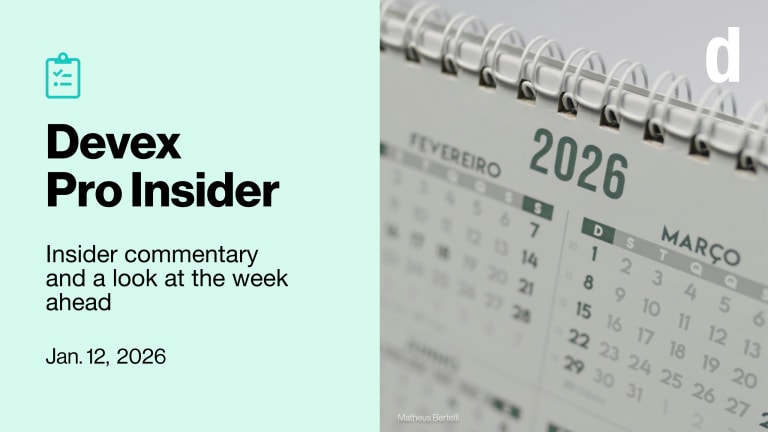Devex Pro Insider: Are you ready for UNGA? We are
Plus, Bill Gates’ optimism, and the U.K.’s efforts to solve the global debt crisis.
Planning a large-scale event on the sidelines of one of the most important gatherings in the world takes a lot of, well, pretty much everything. Persistence, patience, attention to detail, connections, teamwork, a shrewd understanding of international affairs — and time. After all, these things don’t happen overnight. And events in development don’t come bigger than the 80th session of the United Nations General Assembly. So we were already planning for UNGA in January of this year, when the world we report on was turned upside down by the Trump administration’s wholesale dismantling of U.S. foreign assistance. Suddenly, we had to field questions as to whether UNGA would even take place. Flash forward nine months and — despite the U.S. cuts hitting the U.N. hard — UNGA is not only happening, but it could be one of the most consequential yet. We’ll be on the ground this week for it all (I’ve already bought my comfy but classy sneakers) — not just at the U.N. headquarters and dizzying array of side events, but also holding court at our own three-day event, the Devex Impact House, where our news-driven programming will delve into everything from noncommunicable diseases to U.N. reform to development finance. Shameless plug: I’m especially excited to be hosting several one-on-one talks on our Innovation Terrace, where top names in the development and humanitarian sectors will reflect on how they initially navigated the U.S. foreign aid cuts and where they are on that journey. Those reflections are sure to run the gamut: We’ll be talking to organizations whose funding survived the Trump administration’s aid purge and those whose funding vanished overnight. Your mileage may vary, but I’ve rarely stepped inside the U.N. headquarters during the General Assembly. Yes, there are the provocative speeches that occasionally break through the rhetorical tedium — presidents and prime ministers lock arms or horns, and the pomp and circumstance can be impressive (if you can get over the security and gridlock). But to me, the highlights are the niche opportunities UNGA presents: an event on how geospatial technology is fine-tuning irrigation practices in the global south; the ability to grab a coffee with someone who works for an NGO based thousands of miles away; and the chance to just be in the room as people reflect on what this moment of profound change means for the world. UNGA has always been a key date on the development calendar — but its importance has perhaps never been greater for our community. What awaits us on the other side of this era of change will take more than one UNGA to find out, but it’s a start. Bits and pieces Why UNGA? I asked Devex Executive Editor Kate Warren what the annual confab means for her. Despite all the logistical headaches and deeper hardships, she took a positive view: “For me, UNGA is like an annual retreat for the global development community. It’s part strategy session, part therapy, and part serendipity — from marathon meetings to those chance encounters on the sidewalk, it’s where we recharge and rethink why this work matters. I especially look forward to the conversations and lessons that come from gathering so many of our community’s leaders under one roof at Devex Impact House.” Unsustainable development? It’s worth reflecting on how things have changed. Ten years ago, Devex was in New York City to see the launch of the Sustainable Development Goals. Devex Senior Reporter Michael Igoe was there to see them officially adopted — see the picture below, photographed by our very own Kate Warren. Next week, Michael will be back there again to bring you the latest on the progress toward the SDGs. Michael’s still looking fit and well — time has been kind to him — but unfortunately, we can’t say the same for the SDGs, which appear significantly worse for wear. Take this Waltz. U.S. President Donald Trump nominated Mike Waltz to serve as U.S. ambassador to the U.N. after Waltz’s ignominious resignation as national security adviser in the wake of the “Signalgate” scandal. But Waltz has yet to be confirmed by the Senate, meaning he’ll be going to UNGA as a regular Joe Schmoe delegate. But a few of Trump’s U.N. nominees did pass the Senate gauntlet just under the UNGA wire: Jennifer Locetta was confirmed as alternate representative of the U.S. for special political affairs in the United Nations, while Jeffrey Bartos will be the U.S. representative to U.N. Management and Reform. The eternal optimist. Can anything get Bill Gates down? Apparently not. The billionaire philanthropist declared he’s still as optimistic as ever about global health in an article for Time Magazine. He pointed out an interesting tidbit — that if governments simply sustained current health funding levels, “We could cut child deaths in half again over the next 20 years.” Gates is likely to cite such hopeful stats at his foundation’s annual Goalkeepers event in New York City, a popular staple in the UNGA circuit. This year’s event features, among others, actor and director Olivia Wilde; pastor and author Rick Warren; journalist Krista Tippett; ballet dancer and activist Ingrid Silva; and Indonesian health minister Budi Gunadi Sadikin. Franc discussion. Now in its 35th year, the Swiss-based Jacobs Foundation has officially dispensed more than 1 billion Swiss francs since its founding to improve healthy development and learning outcomes for children globally. “We are proud of what this milestone represents: decades of purposeful philanthropic commitment to improving education systems and outcomes for children,” Lavinia Jacobs, chair of the board of trustees at the Jacobs Foundation, said in a statement. “We remain focused on translating evidence into action and on helping education systems respond to the needs of children around the world.” + ICYMI: Check out the Devex Pro Briefing with the Jacobs Foundation on shifting from traditional grants to long-term, data-driven partnerships to transform how national education systems work. The debt don’t die. Can the United Kingdom reclaim its position — at least somewhat — as an aid stalwart? Doubtful. But aid supporters in the U.K. Parliament are at least trying to push the country to take a leading role in global debt reform. International Development Committee Chair Sarah Champion recently called on the British government to compel creditors to take part in discussions about restructuring sovereign debt, according to the committee’s website. In 2023, the committee found that low-income countries were spending more of their national incomes on servicing debt than at any point in the last 30 years. Two years on, Champion says she is “deeply disappointed” by the lack of progress, citing the fact that 28 of the world’s poorest countries are spending more on repaying their foreign debt than on health care or education. + ICYMI: Parliamentarian Noah Law recently penned an opinion piece for Devex on the importance of debt reform. See for yourself. Meanwhile, Jenny Chapman, the U.K.’s development minister, got up close and personal with the aid cuts her government is pursuing. The Guardian reported that she visited a catch-up class for out-of-school children in Accra run by the Ghana Education Outcomes Project, which is almost entirely funded by the U.K. government. She told the media outlet that she wishes she had more money to spend and admitted, “I probably would have said something similar about a year ago, but you’ve got to deal with the world as it is and countries have changed a hell of a lot in recent decades and want to have more control.” Herding Katz. Is Kristalina Georgieva, managing director of the International Monetary Fund, trying to get on the Trump administration’s good side? (She certainly wouldn’t be alone.) Georgieva is proposing that Daniel Katz become the IMF’s first deputy managing director, effective Oct. 6 — an appointment subject to approval by the IMF’s executive board. Katz is currently chief of staff to U.S. Treasury Secretary Scott Bessent, a top Trump ally. Katz has worked on a range of domestic and international matters, including Ukraine and China. Rules of engagement. The Global Engagement Center was a U.S. State Department entity established in 2016 to counter foreign propaganda and disinformation in the United States. But Republicans said it censored conservative voices, and in April, Secretary of State Marco Rubio shut it down. Now, Darren Beattie, the acting undersecretary for public diplomacy and public affairs, has riled up Democratic Senators Jeanne Shaheen and Chris Murphy, who wrote Rubio a letter calling out Beattie’s “widespread transparency effort” regarding the shuttered agency, which could be shared publicly in the coming weeks. “Given Mr. Beattie’s history on this issue, we are deeply concerned that such an initiative will use cherry-picked information to promote the baseless conspiracy theory that the GEC sought to ‘censor’ conservative speech,” they wrote, noting their alarm that personally identifiable information of State Department employees could be released as part of the effort — “putting them at risk simply for carrying out their duties as assigned.” No kidding. Could Rubio become America’s next late-night TV host? U.S. Vice President JD Vance apparently thinks so. He joked that with ABC yanking comedian Jimmy Kimmel off the air for comments he made about the assassination of Charlie Kirk, Rubio could add to his portfolio of jobs, which currently stands at four: secretary of state, acting head of USAID, national security adviser, and acting head of the National Archives and Records Administration. “Everyone please congratulate @marcorubio, the new host of ABC’s late night show!” Vance wrote in a post on X on Thursday. Not everyone may find it a laughing matter, however. Kimmel’s comments and subsequent firing have opened up a raw divide in the U.S. over free speech and censorship. Moving on Aleksander Dardeli is now president and CEO of IREX, a global development and education nonprofit. He previously served as chief operating officer at Save the Children US. “I’m energized to join this extraordinary team of smart, creative doers—people committed to making a difference for America and the world,” he wrote on LinkedIn. “The road ahead won’t be easy. But challenges are what push us to innovate, adapt, and excel.” Carlos Felipe Jaramillo has become the World Bank’s vice president for the East Asia and Pacific region. Jaramillo will oversee partnerships with 23 countries and manage an active portfolio exceeding $32 billion. Jaramillo will be based in Singapore, which will serve as the new regional hub for the EAP region. In another World Bank appointment, Han Fraeters has become the bank’s division director for Papua New Guinea, Solomon Islands, and Vanuatu. “Mr. Fraeters’ appointment comes at a critical juncture for Papua New Guinea as it marks 50 years since its independence and 50 years of partnership with the World Bank Group,” the bank said in a release. “This first-time appointment of a director-level position based in Port Moresby reflects the World Bank’s commitment to moving Bank leadership closer to clients, marking a global shift toward faster, more effective, and higher-impact development support.” Dr. Henshaw Mandi, CEO and president of the Trift Alliance, announced his new role as remote independent expert evaluator for EU projects at the European Research Executive Agency. Rep. Michael McCaul, a Republican from Texas, has announced he won’t seek reelection to the U.S. House of Representatives in 2026. The representative served as the ranking Republican on the House Foreign Affairs Committee from 2019 to 2023 and as chairman from 2023 to 2025. McCaul, who was first elected to Congress in 2004 and is serving his 11th term, vowed to spend the rest of his time making “America stronger and the world safer” — echoing the rhetoric Rubio used around aid. Four global health and science experts widely recognized for their contributions in tackling deadly infectious disease threats have been appointed to key governance positions at the Coalition for Epidemic Preparedness Innovations, or CEPI: • Dr. Githinji Gitahi, group chief executive officer at Amref Health Africa, will take the position of CEPI board vice chair. • Dr. Chikwe Ihekweazu, the executive director of the WHO Health Emergencies Programme, will take up a nonvoting seat on the CEPI board. • Laura A. Palomares, professor at the Instituto Biotecnología at Universidad Nacional Autónoma de México, will be the new chair of CEPI’s scientific advisory committee. • Vaccine manufacturing expert Michael L. King has been reappointed as vice chair of the scientific advisory committee. Up next Devex will be out in force at UNGA this week. We’ll have a series of events on the sidelines at Devex Impact House, where you can hear from experts such as Rémy Rioux, head of the French Development Agency, Helen Clark, former prime minister of New Zealand, and two aid leaders appointed during Trump’s first term — Mark Green, who led USAID, and David Beasley, who led the World Food Programme. Other names include Henrietta Fore, Vanessa Kerry, Kennedy Odede, Michelle Nunn, Nancy Lindborg, Susana Malcorra, Sasha Gallant, Alexis Bonnell, Gargee Ghosh, and more. It will be an exclusive chance for anyone in New York City to meet with development insiders and hear their views on the key issues in the sector. Sessions will touch on a range of topics, including noncommunicable diseases, climate and resilience, artificial intelligence, philanthropy, the post-aid humanitarian landscape, the U.N. at 80, media freedoms, and the future of foreign aid. Don’t miss this event — register now!
Planning a large-scale event on the sidelines of one of the most important gatherings in the world takes a lot of, well, pretty much everything. Persistence, patience, attention to detail, connections, teamwork, a shrewd understanding of international affairs — and time. After all, these things don’t happen overnight. And events in development don’t come bigger than the 80th session of the United Nations General Assembly.
So we were already planning for UNGA in January of this year, when the world we report on was turned upside down by the Trump administration’s wholesale dismantling of U.S. foreign assistance.
Suddenly, we had to field questions as to whether UNGA would even take place. Flash forward nine months and — despite the U.S. cuts hitting the U.N. hard — UNGA is not only happening, but it could be one of the most consequential yet.
This story is forDevex Promembers
Unlock this story now with a 15-day free trial of Devex Pro.
With a Devex Pro subscription you'll get access to deeper analysis and exclusive insights from our reporters and analysts.
Start my free trialRequest a group subscription Printing articles to share with others is a breach of our terms and conditions and copyright policy. Please use the sharing options on the left side of the article. Devex Pro members may share up to 10 articles per month using the Pro share tool ( ).
Anna Gawel is the Managing Editor of Devex. She previously worked as the managing editor of The Washington Diplomat, the flagship publication of D.C.’s diplomatic community. She’s had hundreds of articles published on world affairs, U.S. foreign policy, politics, security, trade, travel and the arts on topics ranging from the impact of State Department budget cuts to Caribbean efforts to fight climate change. She was also a broadcast producer and digital editor at WTOP News and host of the Global 360 podcast. She holds a journalism degree from the University of Maryland in College Park.








